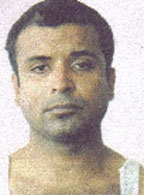Almost six years after being sentenced in the United States for drug trafficking, Shaheed ‘Roger’ Khan is a talking point in the current elections campaign, which has seen former president and PPP/C candidate Bharrat Jagdeo declaring that he never knew the convict and that his proclaimed “crime fighting” were not state-sanctioned.
The PPP/C government under Jagdeo has long been believed to have allowed Khan a free rein to operate in the name of crime fighting after the country experienced an unprecedented crime spree that was triggered by the February 23rd, 2002 Camp Street prison break.
Khan, before he was nabbed in neighbouring Suriname and then handed over to US authorities, had stated in a public advertisement that he had been fighting crime at the behest of the government.

At a press conference last week, Jagdeo denied knowing Khan or shutting down the army’s Military Criminal Intelligence Division (MCID).
It was members of the MCID who had first brought Khan to national attention when in December, 2002, they intercepted and searched a vehicle which contained an arsenal of high-powered weapons as well as surveillance equipment. In the vicinity of the vehicle were Khan, Haroon Yahya and Sean Belfield, then a serving member of the police force. The three were charged but the charges were later dismissed and the army was ordered to return the equipment to Khan.
Recently, retired Lieutenant Colonel George Gomes, in a letter published in Stabroek News, referred to Jagdeo’s recent statements at a press conference, where he said the army may have decided not to go after the criminals during the crime wave of the 2000’s.
However, Gomes noted that as a result of this crime wave, the army established the MCID, which was intended not only to go after the known criminal elements but also to pursue the architects of the crime wave.
Gomes said Jagdeo ordered the closure of the MCID, thereby bringing to an end the process that would have ended the criminal activities. He said Jagdeo’s major fear was that the department, apart from exposing the criminal architects, may have also led to the arrest of senior government functionaries.
“I don’t think I shut it down. I think we had changes. The G2 still operated but you had significant changes in the G2. G2’s never been shut down. You can’t shut down army intelligence,” Jagdeo, however, said when asked.
“I know I never gave a single illegal instruction ever in my tenure, anything that is contrary to the Defence Act, the Constitution nor have I asked anyone to deny any citizen of this country their, any of their rights, including to set up these squad,” he added at a recent PPP/C press conference.
He added that the longstanding perception of a connection with Khan was false. “Roger Khan was never my friend,” he said, before adding that, “in fact, he was friendly, from the intelligence report, with some of the names I mentioned before.” He was hinting at retired members of the military and police force currently aligned with the opposition coalition. Some of the names he had mentioned before included former commissioner of Police Winston Felix, now a candidate for the opposition, retired army Brigadier Edward Collins, who has declared his support for the opposition, and AFC leader Khemraj Ramjattan.
“I never turned a blind eye to anything because we went after all the criminals in the country,” Jagdeo said recently while noting that he never believed that members of the death squad were “helping us.”
Backed by a paramilitary squad
Khan pleaded guilty to trafficking cocaine, witness tampering and gun-running and is now serving a 15-year prison sentence.
Special Agent Cassandra Jackson of the United States Drug Enforcement Administration, in her affidavit to the US Court about Khan’s involvement in the drug trade in Guyana, gave an indication as to how powerful he was.
“Khan was ultimately able to control the cocaine industry in Guyana, in large part, because he was backed by a paramilitary squad that would murder, threaten, and intimidate others at Khan’s directive. Khan’s enforcers committed violent acts and murders on Khan’s orders that were directly in furtherance of Khan’s drug trafficking conspiracy,” she had said.
According to Jackson, the US government’s case was to establish that Khan was the leader of a “violent drug trafficking organisation” and that he and his co-conspirators obtained large quantities of cocaine and then imported the cocaine into the Eastern District of New York and other places for further distribution.
It was while he was managing his drug-smuggling business in neighbouring Suriname that the law finally caught up with Khan.
Suriname’s then Justice Minister Chandrikapersad Santokhi deemed Khan a threat to the national security of Guyana and Suriname and other countries and linked him to plots to assassinate government and judicial officials in that country. According to Santokhi, international agencies, including those in the USA, had been looking for him. However, Guyana’s then Minister of Home Affairs Gail Teixeira formally indicated to Suriname that the government had “no interest” in seeking Khan’s return at that time. Head of the Defence Board, Dr Roger Luncheon had added that the Guyana government could find “no compelling evidence” for Khan to be investigated.
The administration, in fact, seemed more concerned about the manner of Khan’s arrest than his alleged crimes. Luncheon voiced the administration’s concerns by reiterating “its principled objection to the forceful and unlawful removal of its citizen across jurisdictions.”
The beginning of the end of Khan’s criminal career might have been the publication of the US Department of State’s International Narcotics Control Strategy Report for 2005, which was released in March, 2006.




